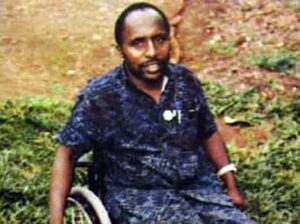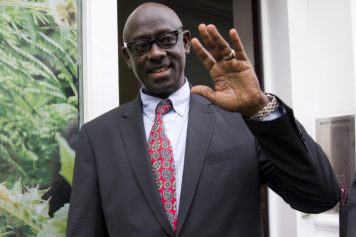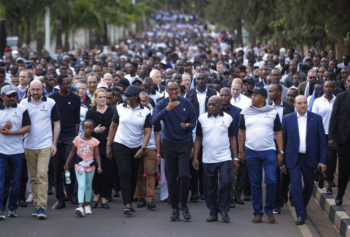
Pascal Simbikangwa, who is paraplegic after a car crash, was arrested in 2008 while living under an alias on France’s Indian Ocean island of Mayotte.
His lawyers argue that he is being made a scapegoat for the killings.
France has been accused of being too slow to prosecute those allegedly linked to the genocide.
Hundreds of thousands of Rwandans perished over 100 days in 1994.
After the genocide, many Rwandans fled to France as they share a common language and used to enjoy close diplomatic relations.
Mr Simbikangwa, 54, is accused of helping to arm ethnic Hutu militia who manned roadblocks in the capital, and instructing them about their part in the slaughter.
He faces the possibility of life in jail even though charges against him have been downgraded from genocide and crimes against humanity to complicity in these crimes.
Unusually for France, the trial – which is expected to last six to eight weeks – will be filmed, with recordings available once the case is concluded.
Mr Simbikangwa has acknowledged being close to the government of President Juvenal Habyarimana, a Hutu whose assassination in 1994 led to the outbreak of violence that killed some 800,000 ethnic Tutsis and moderate Hutus in Rwanda.
More than 50 journalists, historians, farmers, security guards and former intelligence officials are expected to be called as witnesses in the trial.
‘Not guilty verdict’
The trial started with a request from Mr Simbikangwa’s lawyers for the case to be thrown out. One of them argued that the case could not be fair because of the “inequality of power” between the prosecution and defence.
The defence team said they did not have the “means” to represent him properly and had not even been able to visit Rwanda to verify prosecution evidence.
They also attacked the prosecution’s case as being based purely on unchallenged witness accounts.
“We’ll do what we have done from the start – plead for a not guilty verdict,” defence lawyer Fabrice Epstein said.
Mr Simbikangwa said little in court, apart from reading out a brief statement in which he acknowledged that he was a “captain in the Rwandan army, then in the intelligence services”.
Lawyer Simon Foreman, who represents civil parties in the case, said the charge of complicity “in no way diminishes the responsibility” of Mr Simbikangwa, whom he described as “a cog in a mechanism operated by others”.
Read the full story at bbc.co.uk


